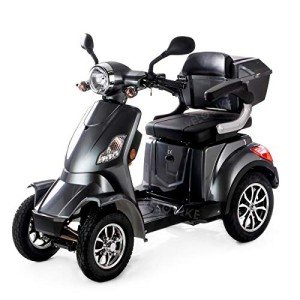این شرکت آگهی شغل فعال ندارد
0 دیدگاه
به این کمپانی امتیاز دهید (هنوز دیدگاهی ندارد)
درباره ما
You’ll Never Guess This Mobility Scooter UK’s Secrets

Mobility Scooters in the UK: A Comprehensive Guide
In the United Kingdom, mobility scooters are becoming a progressively popular methods of transportation for individuals with mobility problems, offering them with the liberty to browse their communities independently. These motorized vehicles are designed to assist those who have difficulty walking or using a manual wheelchair, offering a useful and comfortable service for everyday travel. This post dives into the world of mobility scooters in the UK, exploring their advantages, legal requirements, and how to select the right one.
Intro to Mobility Scooters
A mobility scooter is a battery-powered lorry that normally has 3 or four wheels, a seat for the driver, and handlebars for guiding. They are developed to be simple to utilize and maintain, making them perfect for older grownups and individuals with impairments who wish to preserve their self-reliance. Mobility scooters come in various sizes and designs, each catering to different requirements and preferences.
Benefits of Mobility Scooters
- Increased Independence: Mobility scooters allow users to travel longer ranges without the physical strain related to strolling or using a manual wheelchair. This self-reliance can significantly improve their quality of life.
- Economical: Compared to other motorized cars, mobility scooters are fairly economical. They likewise require very little upkeep, which can save users a great deal of money in the long run.
- Relieve of Use: Most mobility scooters are designed to be easy to use, with instinctive controls and comfortable seating. They are frequently light-weight and can be quickly taken apart for transportation.
- Improved Social Interaction: By making it possible for users to venture out more frequently, mobility scooters can help minimize sensations of seclusion and solitude, fostering social connections and community participation.
- Improved Safety: Mobility scooters are geared up with features such as headlights, brake lights, and horns, making them safer for use on roads and in public spaces.
Types of Mobility Scooters
When choosing a mobility scooter, it’s crucial to consider the type that best fits your requirements. Here are the primary types readily available in the UK:
-
Class 2 Mobility Scooters:
- Speed: Limited to 4 miles per hour (6.4 km/h)
- Usage: Suitable for pavements and pedestrian locations
- Functions: Compact and light-weight, collapsible for simple transportation
-
Class 3 Mobility Scooters:
- Speed: Can rise to 8 miles per hour (12.9 km/h)
- Usage: Suitable for both pavements and roads, provided they are registered and insured
- Features: Sturdier build, often with advanced features like suspension and bigger batteries
-
Strong Mobility Scooters:
- Capacity: Designed to support users weighing as much as 400 pounds (181 kg)
- Usage: Ideal for those who need a robust and resilient scooter
- Functions: Reinforced frame, larger seat, and enhanced stability
-
Off-Road Mobility Scooters:
- Terrain: Built to handle rough and irregular surfaces
- Use: Suitable for users who enjoy outside activities like hiking or fishing
- Functions: All-terrain tires, high ground clearance, and powerful motors
Legal Requirements for Mobility Scooters in the UK
Using a mobility scooter in the UK features specific legal duties. Here are the key points to consider:
- Registration and Insurance:
- Class 2 Scooters: No registration or insurance coverage needed
- Class 3 Scooters: Must be registered with the DVLA, insured, and display a legitimate MOT certificate if utilized on roadways
- Chauffeur Requirements:
- Age: Users must be at least 14 years of ages
- Health: No specific health conditions are required, but users should have the ability to manage the scooter safely
- Speed Limits:
- Class 2 Scooters: 4 mph (6.4 km/h) on pavements
- Class 3 Scooters: 8 mph (12.9 km/h) on roads, 4 mph on pavements
- Safety Equipment:
- Lights: All scooters utilized on roads must have front and rear lights, indicators, and a horn
- Reflectors: Required for usage on roads, specifically during low visibility conditions
- Tax and Parking:
- Tax: Class 3 scooters are exempt from lorry tax
- Parking: Users can park in designated disabled parking areas with a valid Blue Badge
How to Choose the Right Mobility Scooter
Selecting the best mobility scooter includes thinking about a number of elements:
-
Mobility Needs:
- Range: How far do you require to travel?
- Surface: Will you be utilizing the scooter on pavements, roads, or off-road?
- Weight Capacity: What is the optimum weight the scooter needs to support?
-
Spending plan:
- Initial Cost: Mobility scooters can vary from a couple of hundred to a number of thousand pounds
- Continuous Costs: Consider the cost of batteries, upkeep, and insurance
-
Features:
- Comfort: Look for a scooter with a comfy seat and adjustable controls
- Storage: Some scooters use additional storage for shopping bags or individual items
- Portability: If you need to carry the scooter, choose a model that is light-weight and foldable
-
Credibility and Support:
- Brand: Research trustworthy brand names understood for their quality and dependability
- Warranty: Check the warranty period and what it covers
- Client Support: Ensure the producer or merchant provides good client assistance and service
Frequently Asked Questions About Mobility Scooters in the UK
-
Do I need a license to drive a mobility scooter?
- No, you do not need a driving license to run a mobility scooter in the UK. However, Class 3 scooters must be signed up with the DVLA and guaranteed if used on roads.
-
Can I utilize a mobility scooter on the pavement?
- Yes, both Class 2 and Class 3 scooters are allowed on pavements, but Class 3 scooters are restricted to 4 mph.
-
Exist any constraints on where I can use a Mobility scooter uk scooter?
- Class 2 scooters are limited to pavements and pedestrian locations. Class 3 scooters can be used on roadways, but they should meet specific legal requirements.
-
How do I preserve my mobility scooter?
- Regular upkeep consists of checking battery levels, tire pressure, and brake functionality. It’s also important to clean up the scooter routinely and save it in a dry place.
-
Can I get a mobility scooter through the NHS?
- The NHS supplies mobility scooters through the Disabled Living Allowance (DLA) or Personal Independence Payment (PIP). You can also acquire or lease a scooter from a personal retailer.
-
Is a mobility scooter tax-deductible?
- In many cases, the cost of a mobility scooter can be declared as a medical expenditure. Seek advice from a monetary consultant for specific assistance.
Tips for Using a Mobility Scooter Safely
- Use Appropriate Clothing:
- Wear comfy and weather-appropriate clothing. Consider wearing a high-visibility jacket when utilizing the scooter on roads.
- Keep the Scooter:
- Regularly inspect the battery, tires, and brakes to ensure the scooter is in great working condition.
- Follow Traffic Rules:
- Obey traffic indications and signals, and use designated pedestrian and cycle courses when possible.
- Usage Safety Equipment:
- Always use the headlights, brake lights, and horn, specifically throughout low presence conditions.
- Be Mindful of Others:
- Be courteous to pedestrians and other roadway users. Decrease when approaching crowded areas.
Mobility scooters are an important tool for individuals in the UK who face mobility difficulties. They use a variety of advantages, from increased self-reliance to improved security, making them a popular choice for older adults and people with impairments. By comprehending the various types of scooters, legal requirements, and how to select the ideal one, users can take pleasure in the flexibility and convenience these lorries offer. Whether for everyday errands or leisure activities, a mobility scooter can significantly improve the quality of life for lots of people.
Additional Resources
- DVLA Website: For details on registering and insuring a Class 3 mobility scooter
- Age UK: Offers guidance and support for older adults considering a mobility scooter
- Disability Rights UK: Provides assistance on accessing mobility scooters through financial assistance programs
By making the effort to research and choose the right mobility scooter, users can take pleasure in higher self-reliance and a more active lifestyle.




